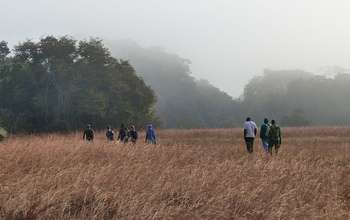NSF and USAID announce latest round of awards to address global development challenges

Building sustainable fisheries, monitoring landslide risk, studying the emerging bioeconomy: these are some of the research projects announced today in the newest round of an interagency partnership to foster collaborative global research.
The National Science Foundation (NSF) and U.S. Agency for International Development (USAID) awards will advance the scientific and technical capacity of the U.S. and countries in critical areas of development. The projects are the latest set of Partnerships for Enhanced Engagement in Research (PEER) awards, which pair NSF-funded U.S. scientists with researchers in developing countries, who are funded by USAID.
NSF's 16 PEER awards span eight countries and include research in ocean acidification, malarial transmission, climate adaptation and more.
"By linking NSF-funded scientists and engineers with foreign counterparts, we can leverage U.S. investment while strengthening global research capacity," said Jessica Robin, NSF program director for PEER. "These projects tackle crucial research areas, such as biodiversity conservation and food security, which affect the lives of millions worldwide."
There are 45 total research projects in this year's PEER program, selected from more than 500 proposals and representing a $10 million investment from USAID.
This year's solicitation included a special focus on transboundary water issues in Central Asia, an effort to generate sustainable solutions to critical water issues in the region. Scientists from Uzbekistan, Tajikistan and Kyrgyzstan will partner with Johns Hopkins University researchers to examine water resource management in the Anu Darya river basin, one of the largest in Central Asia. Another team from Kyrgyzstan, Kazakhstan and Tajikistan will work with scientists from University of Idaho on glacier dynamics.
PEER is a collaboration between USAID and eight federal science agencies, including NSF, NASA, the National Institute of Food and Agriculture, the National Institutes of Health, the Smithsonian Institution, the United States Department of Agriculture's Agricultural Research Service, the United States Forest Service, and the United States Geological Service. The program is administered by the National Academy of Sciences.
PEER has supported more than 150 projects in over 40 countries since its start in 2011. The next call for PEER pre-proposals will open in October 2015.
Provided by National Science Foundation